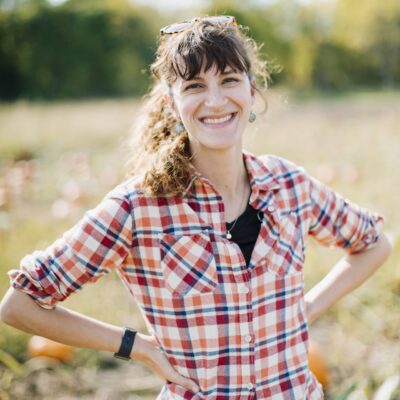Student Spotlight: Libby Indermaur

April 28, 2025
Libby Indermaur is a doctoral candidate in plant pathology and plant-microbe biology from Raleigh, North Carolina. She earned her B.S. in horticultural science from North Carolina State University and now studies fungi that cause disease on Northeast vegetable crops under the guidance of Chris Smart at Cornell.
What is your area of research and why is it important?
There are many microscopic organisms that cause diseases in plants, especially fungi. These are distant relatives of some mushrooms we’re familiar with like morels and cup fungi, but instead of decomposing dead plant material, they parasitize live plants. I study these types of fungi that cause disease on vegetable crops in the Northeast, including pumpkin and rhubarb. Specifically, I explore how to manage these pathogens using tools that include fungicides, host resistance, and population genomics. Improving our disease management recommendations can help growers reduce costs, improve yields, and ensure the long-term viability of their businesses.
What are the larger implications of this research?
Northeastern vegetable growers are not only important members of our local economies, but they are also vital contributors to our regional and national food supply. They deal with crop diseases every season. As growing conditions change, some diseases may worsen while many may become more difficult and expensive to manage. If we can integrate several strategies, each of which manages a disease using a different mechanism, we can help growers decrease long-term costs. As conditions in other regions become increasingly suitable for diseases we have here, these findings can be translated to support growers elsewhere.
What does it mean to you to be a Bouchet Scholar?
At the 21st annual Yale Bouchet Conference on Graduate Education, Gerald Torres closed his plenary talk on environmental justice by saying, “We have work to do. And the work is never done while the power to work remains.” That is what being a Bouchet Scholar means to me. To identify a need, to see my own agency, to advocate for those who are impacted, and to invite others to join me. To be dedicated. To be grateful. To be persistent in questioning my own conclusions. And to hear a call and to respond to it.
How do you exemplify the five pillars of the Bouchet Society—character, leadership, advocacy, scholarship, and service?
As a queer woman in agriculture, I:
- Serve two communities: queer students in science and underrepresented trainees in plant pathology.
- Advocate for queer students in agriculture, by writing about how to recruit and protect those who are in colleges of agriculture.
- Lead within my communities at Cornell including the graduate student associations in my department and at Cornell AgriTech.
- Strive for excellence in character and scholarship by leveraging my love of learning to invite others to ask questions about and contribute to plant pathology.
What are your hobbies or interests outside of your research or scholarship?
Outside of my research (but this impacts how I approach my research), I love history. I am very interested in the history of science, of disciplines related to what I study like mycology and botany, and of the crops I study. I really enjoy outdoor sports, especially climbing, biking, and hiking, and appreciate the access I have to the outdoors in the Finger Lakes. I am glad to share many of these interests with my wife, who’s a fellow plant pathologist. If we could be anywhere right now, it would be a tie between a library, a museum, or a New York state park.
Why did you choose Cornell to pursue your degree?
Cornell has a long history of excellence in plant pathology and mycology. Much of what I studied during my undergraduate program referenced foundational and leading research from Cornell faculty. I was drawn to the expertise in the School of Integrative Plant Science and the emphasis that their faculty place on transcending departmental boundaries. The community at Cornell AgriTech is uniquely collaborative and supportive, enabling me to work at the intersection of fungal biology, plant protection, breeding, food science, and population genomics. I would choose Cornell, every time.
